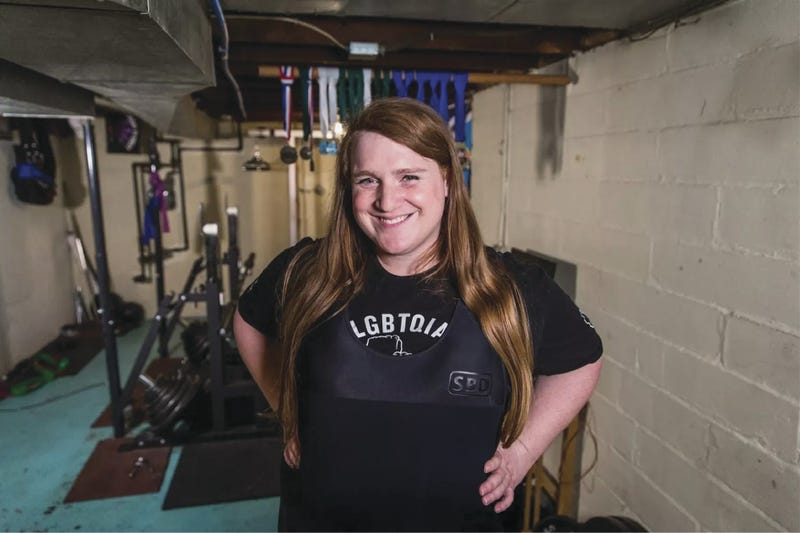
MINNEAPOLIS (AP) — The Minnesota Supreme Court on Wednesday delivered a win to a transgender weightlifter, saying she's protected by the state's expansive human rights law, while the organization that banned her from competing in its women's division said it still has a chance.
The high court found that USA Powerlifting's policy that bars JayCee Cooper from competing in its women's division is “facially discriminatory” under the Minnesota Human Rights Act. That law protects transgender individuals against discrimination based on sexual orientation.
While the court sent part of the case back to a lower court to determine whether USA Powerlifting has a “legitimate business purpose” for excluding JayCee Cooper, her attorneys said they won on the most important legal claim and that further proceedings won't change the ultimate outcome.
LGBTQ+ rights advocates call it a big victory
The LGBTQ+ rights group Gender Justice, which represents Cooper, claimed the ruling as a complete victory, noting that Cooper won on the issue of state law barring discrimination in a place of public accommodation. The group also said the ruling goes further and will protect all transgender people in Minnesota against discrimination.
“That claim will not be unraveled,” Gender Justice legal counsel Jess Braverman said.
The justices noted that the law carves out a “legitimate business purpose defense,” and said there is a “genuine dispute of material fact” on whether “seeking to ensure competitive fairness in an athletic competition” meets that test. So it sent the case back to the original trial court for further proceedings.
But Braverman said they only needed to win on the public accommodations claim, which they did, and that the ruling still legally trumps USA Powerlifting's arguments.
USA Powerlifting calls it a partial win for both sides
USA Powerlifting attorney Ansis Viksnins called it a mixed decision — a partial victory for both sides.
“Our opponents like to spin losses as victories and victories and victories, so I’m not surprised that they are claiming this is a victory,” Viksnins said in an interview.
He said the ruling means they will get to tell a jury “why excluding a transgender woman from competing in the women’s division was for legitimate reasons, for maintaining fairness in athletics.” And he said they'll get to argue that transgender women have an unfair strength advantage in powerlifting.
But to win on the remaining issue, Braverman said, the courts would have to do so on an impossibly narrow track. She said the court left only a “really narrow carve-out” that doesn't leave much room for discrimination.
The dispute dates back to 2018
USA Powerlifting rejected Cooper’s application in 2018 to compete in its women’s division. Cooper sued in 2021, and the trial court sided with her.
But the Minnesota Court of Appeals sent the case back to the trial court, saying there were “genuine issues of fact” about whether USA Powerlifting excluded Cooper because of her transgender identity and whether the organization had a “legitimate business reason” for doing so. Cooper then took the case to the state’s highest court.
The justices ordered that the trial court must now address whether USA Powerlifting has a defense, based on its claim “that fair competition opportunities for similarly situated athletes is a legitimate business reason, that its interpretation of fair play is based on unique considerations of powerlifting,” and on evidence the group says shows that transgender women powerlifters enjoy strength advantages.
Transgender athletes nationwide
Transgender people’s participation in sports has been a contentious issue across the country. According to the Movement Advancement Project, a nonprofit that says it works to advance equality and opportunity for all, 29 states bar transgender women and girls from competing in at least some women’s or girls competitions, though some of those bans have been blocked by court orders.
Late last month, President Donald Trump’s administration said the state of Minnesota and its governing body for high school sports are violating a key federal law against sex discrimination by allowing transgender athletes to compete in girls sports.
Republicans express deep dismay, say they'll try to change the law
The Minnesota Human Rights Act contains broad protections against discrimination, including on the basis of sex defined broadly, and was updated in 2023 when Democrats controlled the Legislature to specifically include gender identity.
Republicans reacted with outrage. GOP Minnesota House Speaker Lisa Demuth called the ruling “another setback in the fight to protect girls sports,” and said in a statement that GOP lawmakers will try to change the law in the 2026 legislative session. However, the House is now tied 67-67 between Republicans and Democrats, and Democrats only narrowly control the Senate, so nothing can pass without some bipartisan support.
The No. 2 House GOP leader, Rep. Harry Niska, said Republicans saw the ruling coming, so they tried unsuccessfully to change the law earlier this year. They'll keep trying, he said.
“Whether intentional or not, this decision has sweeping implications that could effectively eliminate girls’ sports in Minnesota unless we provide statutory clarification,” Niska said in a statement.
In an indication of the intense interest in the Minnesota case, numerous athletes and organizations on both sides filed friend-of-the-court briefs, including former tennis champion Martina Navratilova, who was part of a group of 83 female athletes backing USA Powerlifting’s position.
Since the legal arguments were based largely on how the courts should interpret Minnesota law, the decision doesn't set a binding precedent for other states. But courts elsewhere faced with similar issues could choose to draw on the legal reasoning behind it.
Asked Wednesday if Cooper plans to continue competing with USA Powerlifting, Braverman hedged, noting that seven years have passed since Cooper had last sought to compete in the organization.
“We’ll have to discuss that with her,” Braverman said.
——-
Beck reported from Omaha, Nebraska.